Breaking the Bonds of Fate: Epicurus and Marx (forthcoming 2025)
Category: Authored
Sole Authored Books
-

The Dialectics of Ecology: Socialism and the Defense of Nature
The Dialectics of Ecology: Socialism and the Defense of Nature (New York: Monthly Review Press, 2023), 360 pp.
 Today the fate of the earth as a home for humanity is in question—and yet, contends John Bellamy Foster, the reunification of humanity and the earth remains possible if we are prepared to make revolutionary changes. As with his prior books, The Dialectics of Ecology is grounded in the contention that we are now faced with a concrete choice between ecological socialism and capitalist exterminism, and rooted in insights drawn from the classical historical materialist tradition. In this latest work, Foster explores the complex theoretical debates that have arisen historically with respect to the dialectics of nature and society. He then goes on to examine the current contradictions associated with the confrontation between capitalist extractivism and the financialization of nature, on the one hand, and the radical challenges to these represented by emergent visions of ecological civilization and planned degrowth, on the other.
Today the fate of the earth as a home for humanity is in question—and yet, contends John Bellamy Foster, the reunification of humanity and the earth remains possible if we are prepared to make revolutionary changes. As with his prior books, The Dialectics of Ecology is grounded in the contention that we are now faced with a concrete choice between ecological socialism and capitalist exterminism, and rooted in insights drawn from the classical historical materialist tradition. In this latest work, Foster explores the complex theoretical debates that have arisen historically with respect to the dialectics of nature and society. He then goes on to examine the current contradictions associated with the confrontation between capitalist extractivism and the financialization of nature, on the one hand, and the radical challenges to these represented by emergent visions of ecological civilization and planned degrowth, on the other.The product of contemporary ecosocialist debates, The Dialectics of Ecology builds on earlier works by Foster, including Marx’s Ecology (2000) and The Return of Nature (2020), aimed at the development of a dialectical naturalism and the formation of a path to sustainable human development.
-

Capitalism in the Anthropocene: Ecological Ruin or Ecological Revolution
 Capitalism in the Anthropocene: Ecological Ruin or Ecological Revolution (New York: Monthly Review Press, forthcoming 2022), 693 pp.
Capitalism in the Anthropocene: Ecological Ruin or Ecological Revolution (New York: Monthly Review Press, forthcoming 2022), 693 pp.Over the last 11,700 years, during which human civilization developed, the earth has existed within what geologists refer to as the Holocene Epoch. Now science is telling us that the Holocene Epoch in the geological time scale ended, replaced by the onset of a new, more dangerous Anthropocene Epoch, which began around 1950. The Anthropocene Epoch is characterized by an “anthropogenic rift” in the biological cycles of the Earth System, marking a changed reality in which human activities are now the main geological force impacting the earth as a whole, generating at the same time an existential crisis for the world’s population.
What caused this massive shift in the history of the earth? In this comprehensive study, John Bellamy Foster tells us that a globalized system of capital accumulation has induced humanity to foul its own nest. The result is a planetary emergency that threatens all present and future generations, throwing into question the continuation of civilization and ultimately the very survival of humanity itself. Only by addressing the social aspects of the current planetary emergency, exploring the theoretical, historical, and practical dimensions of the capitalism’s alteration of the planetary environment, is it possible to develop the ecological and social resources for a new journey of hope.
What people are saying about Capitalism in the Anthropocene
John Bellamy Foster has returned Socialism to a serious and sincere engagement with nature. He is as adept at navigating the latest scientific literature as he is comfortable with the immense body of Marxist theory. JBF is a key reference for the elaboration of our political struggles and for the expansion of our political imagination.
―Vijay Prashad, Director, Tricontinental: Institute for Social Research
-

The Robbery of Nature: Capitalism and the Ecological Rift

The Robbery of Nature: Capitalism and the Ecological Rift (coauthored with Brett Clark) (New York: Monthly Review Press), January 2020.
Consists of eleven chapters mostly based on articles previously published in Monthly Review 2016-2018, all developed around a central theme and developed into an argument in book form. Nine of the articles/chapters have been previously published, two will first appear in this book. Seven of the chapters in the book were written (or are being written) by the two authors together, three were originally written by Foster as sole author.
In the nineteenth century, Karl Marx, inspired by the German chemist Justus von Liebig, argued that capitalism’s relation to its natural environment was that of a robbery system, leading to an irreparable rift in the metabolism between humanity and nature. In the twenty-first century, these classical insights into capitalism’s degradation of the earth have become the basis of extraordinary advances in critical theory and practice associated with contemporary ecosocialism. In The Robbery of Nature, John Bellamy Foster and Brett Clark, working within this historical tradition, examine capitalism’s plundering of nature via commodity production, and how it has led to the current anthropogenic rift in the Earth System.
Departing from much previous scholarship, Foster and Clark adopt a materialist and dialectical approach, bridging the gap between social and environmental critiques of capitalism. The ecological crisis, they explain, extends beyond questions of traditional class struggle to a corporeal rift in the physical organization of living beings themselves, raising critical issues of social reproduction, racial capitalism, alienated speciesism, and ecological imperialism. No one, they conclude, following Marx, owns the earth. Instead we must maintain it for future generations and the innumerable, diverse inhabitants of the planet as part of a process of sustainable human development.
This extraordinary work demonstrates, in clear and lucid prose, that capitalism is setting out doom for all of us, flora and fauna alike, and that a cooperative society is our only salvation. A book for popular readers and scholars alike, it will be widely recognized as an instant classic.
—Paul Buhle, retired Senior Lecturer, Brown University
Emerging from one of the most generative collaborations in the ecosocialist tradition, this collection of essays by John Bellamy Foster and Brett Clark represents a critical step forward in theoretical development and recovery, with immediate relevance to contemporary political movements and debates. Foster and Clark beautifully reveal the power of historical materialism to lay bare the connection between ecological degradation, speciesism, and social domination, and therefore the necessity of a struggle that does not artificially isolate in theory and practice what is joined in reality. This is a book for serious activists seeking to understand the world in order to change all of it that needs changing, so that every living being on earth may not only survive, but finally, be free.
—Hannah Holleman, author of Dust Bowls of Empire: Imperialism, Environmental Politics, and the Injustice of “Green” Capitalism
Long recognized as leading theorists of ecomarxism, Bellamy Foster and Clark here extend their “metabolic rift” paradigm to an impressive range of issues, including gender, food, British eco-imperialism in Ireland, “alienated speciesism,” the theory of value, and the meaning of work. The result is a powerful case that capitalism is inextricably bound up with the robbery of nature and constitutes the paramount obstacle to life on Earth as we know it.
—Nancy Fraser, New School for Social Research; author, Fortunes of Feminism: From State-Managed Capitalism to Neoliberal Crisis
-
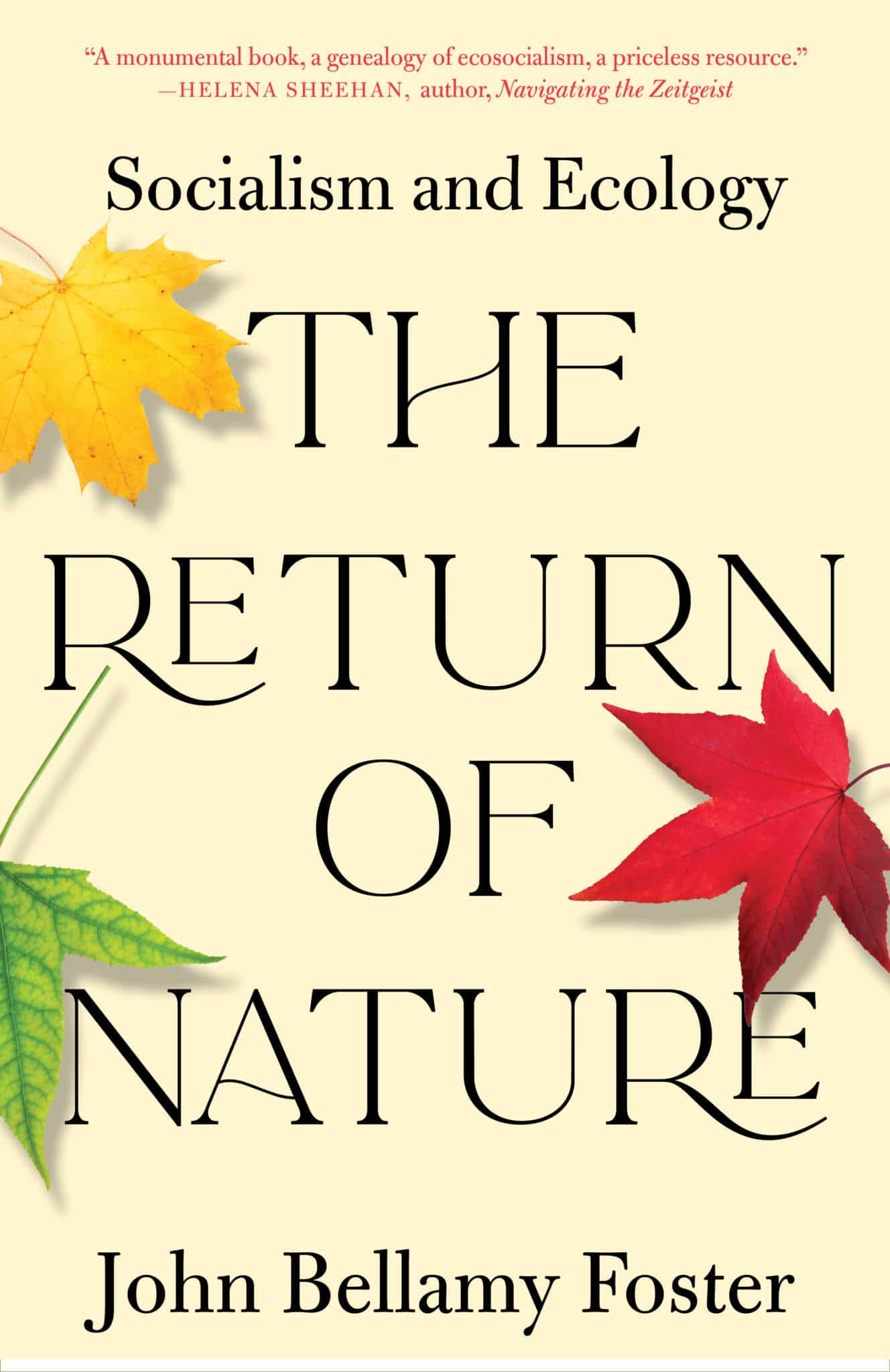
The Return of Nature: Socialism and Ecology
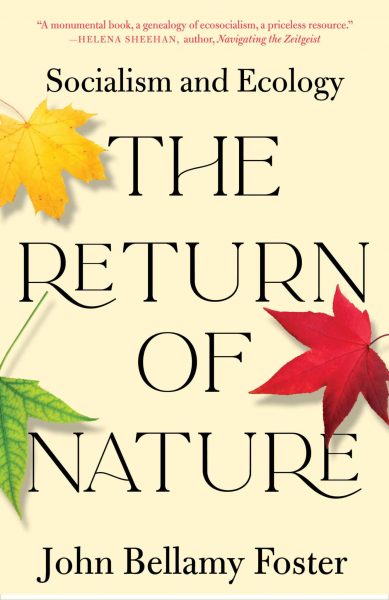 The Return of Nature: Socialism and Ecology, New York: Monthly Review Press.
The Return of Nature: Socialism and Ecology, New York: Monthly Review Press.Twenty years ago, John Bellamy Foster’s Marx’s Ecology: Materialism and Natureintroduced a new understanding of Karl Marx’s revolutionary ecological materialism. More than simply a study of Marx, it commenced an intellectual and social history, encompassing thinkers from Epicurus to Darwin, who developed materialist and ecological ideas. Now, with The Return of Nature: Socialism and Ecology, Foster continues this narrative. In so doing, he uncovers a long history of efforts to unite issues of social justice and environmental sustainability that will help us comprehend and counter today’s unprecedented planetary emergencies.
The Return of Nature begins with the deaths of Darwin (1882) and Marx (1883) and moves on until the rise of the ecological age in the 1960s and 1970s. Foster explores how socialist analysts and materialist scientists of various stamps, first in Britain, then the United States, from William Morris and Frederick Engels to Joseph Needham, Rachel Carson, and Stephen Jay Gould, sought to develop a dialectical naturalism, rooted in a critique of capitalism. In the process, he delivers a far-reaching and fascinating reinterpretation of the radical and socialist origins of ecology. Ultimately, what this book asks for is nothing short of revolution: a long, ecological revolution, aimed at making peace with the planet while meeting collective human needs.
In the century following Marx’s death, left-wing scientists and writers made major contributions to the development of modern ecological thought. Foster’s brilliant new book recovers that history, making the work and ideas of those neglected ecosocialist pioneers accessible to the activists who are building today’s movements against global environmental destruction.
—Ian Angus, author, Facing the Anthropocene; editor, Climate & Capitalism
What does ecology have to do with a critique of capitalism and a movement for socialism? What are the roots of ecosocialism? For more than twenty years, John Bellamy Foster has engaged in serious thought and massive research, delving into the relation of ecology and socialism, while charting the odyssey of the network of left activist-intellectuals who forged a philosophical-scientific-political vision of our ecosystem and the forces threatening its survival. The result is a monumental book, a genealogy of ecosocialism, a priceless resource for those pursuing this path today.
—Helena Sheehan, author, Marxism and the Philosophy of Science and Navigating the Zeitgeist
Leftists have too readily seen capitalist science and technology’s goal—the domination of nature—as inherently progressive. In The Return of Nature, John Bellamy Foster tells a different story. The recognition that we humans, rather than dominating, are part of nature, both transformed by and transforming it, was central to Marx and Engels’ dialectical thinking. Foster’s richly detailed and ground-breaking history tells the story of the British and American scientists and activists who in the century following Marx’s death, adopted and built on this dialectical tradition, from Engels’ Dialectics of Nature to the fast developing science of ecology and the birth of the radical science movements of the 1970s. A tour de force.
—Steven Rose, emeritus professor of neuroscience, Open University
By now, many people will have heard about the ecological ideas of Karl Marx. And everyone knows that the modern environmental movement is filled with anti-capitalist energies. But was there anything in between? In this landmark work, John Bellamy Foster fills in the gap and reconstructs an unbroken genealogy of dialectical thinking about the environment, from the last days of Marx to the first stirrings of Western environmentalism. From the neglected writings of numerous thinkers and scientists—evolutionary biologists, not the least—he reconstructs a treasure trove of ecological insights that will keep scholars and activists preoccupied for years to come. The common knowledge of Marx’s environmentalist leanings derives from Foster’s Marx’s Ecology from 2000. With The Return of Nature, he has given ecological Marxism an epic chronicle that speaks straight to the crises of our times: a sequel and prequel of extraordinary power.
—Andreas Malm, author, Fossil Capital: On the Rise of Steam Power and the Roots of Global Warming
John Bellamy Foster’s magnificent The Return of Nature tells the story of the late nineteenth and early twentieth scientists and other intellectuals who followed paths laid out by Marx and Engels with respect to the profit-driven degradation of the environment and biosphere. Foster convincingly depicts the genesis, in the writings of figures such as William Morris, Joseph Needham, and Rachel Carson, of an ecosocialist vision whose further development represents the best hope of the present period. He helps us answer the question posed by one of the book’s heroes, the novelist and essayist Christopher Caudwell (1907-1937), “How can we think of the future without holding it to our own barrenness?”
—Stuart A. Newman, Professor of Cell Biology and Anatomy, New York Medical College; coauthor, Biotech Juggernaut: Hope, Hype, and Hidden Agendas of Entrepreneurial Bioscience
-

Trump in the White House: Tragedy and Farce
Trump in the White House: Tragedy and Farce, with a foreword by Robert W. McChesney (New York: Monthly Review Press, 2017), 160 pp.
Remember that metaphor about the frog that slowly cooks to death in the pot of increasingly warm water? Leftists have used it for years to describe how people can accept dwindling health care, fading job opportunities, eroding racial and gender equality—as long as the loss occurs gradually. Now, with Donald Trump having slouched off to Washington, most of the mainstream media are working overtime to convince us that we can still stand the heat. Leave it to John Bellamy Foster, one of the world’s outstanding radical scholars, to expose Trump for who and what he is: a neo-fascist. Just at the boiling point, Foster offers us cool logic to comprehend the system that created Trump’s moral and political emergency—and to resist it.
In Trump in the White House, John Bellamy Foster does what no other Trump analyst has done before: he places the president and his administration in full historical context. Foster reveals that Trump is merely the endpoint of a stagnating economic system whose liberal democratic sheen has begun to wear thin. Beneath a veneer of democracy, we see the authoritarian rule that oversees decreasing wages, anti-science and climate-change denialism, a dying public education system, and expanding prisons and military—all powered by a phony populism seething with centuries of racism that never went away.
But Foster refuses to end his book in despair. Inside his analysis is a clarion call to fight back. Protests, popular demands, coalitions: everyone is needed. Change can’t happen without radical, anti-capitalist politics, and Foster demonstrates that—even now, with the waters ever warming—it may yet be possible to stop the desecration of the Earth; to end endless war; to create global solidarity with all oppressed people. Could a frog do that?
By rejecting the term “populism” that is widely used to describe the Trump phenomenon and other similar ones around the globe at present, and using the term “neo-fascism” instead, John Bellamy Foster has done a great theoretical service to the Left. This shift in conceptual perspective prompts him to compare current developments to those in the 1930s, to examine their political economy roots, and to highlight the “destruction of reason” that characterizes all fascism, then and now. This book is a pioneering contribution that is extremely important and valuable.
—Prabhat Patnaik, professor emeritus, economics, Jawaharlal Nehru University; author (with Utsa Patnaik), A Theory of Imperialism
Disdain for human rights, elections, democracy; hatred of intellectuals, artists and journalists; obsession with power and punishment, with being first and biggest and right; rampant corruption, corporate cronyism, runaway nationalism, racism, homophobia and sexism: the Trump White House is a neo-fascist project. Resistance is possible, but only if we name things for what they are and trace Trumpism to its neoliberal roots. “To see what is in front of one’s nose needs a constant struggle” said Orwell. Lucky for us, John Bellamy Foster is doing the work.
—Laura Flanders, broadcast journalist; host, The Laura Flanders Show; author, Blue Grit: Making Impossible, Improbable, and Inspirational Political Change in America
John Bellamy Foster’s Trump in the White House should be read by all those concerned not only about Trump but about the social conditions that produced this phenomenon. No doubt we have reached a stage where democracy has become antithetical to capitalism, where the bosses of the world would rather muffle democratic institutions than allow their property to be touched. JBF goes beneath the surface, demanding that we follow, asking for more radical change than merely the removal of Trump.
—Vijay Prashad, author, The Poorer Nations: A Possible History of the Global South
Informed and informative, thoughtful and thought-provoking, exceptionally well written, organized and presented, Trump in the White House: Tragedy and Farce is unreservedly recommended reading for every citizen and should be a part of every community and academic library Contemporary Political Science collection in general, and Donald Trump supplemental studies reading list in particular.
—Midwest Book Review
Praise for The Endless Crisis:
The authors carefully develop a powerful case that the normal state of ‘really existing capitalist economies,’ increasingly dominated by multinational megacorporations along with associated financialization, is not growth with occasional recession, but rather stagnation with occasional escapes that have diminishing prospects. Hence an ‘endless crisis.’… This valuable inquiry should be carefully studied and pondered, and should be taken as an incentive to action.
—Noam Chomsky
-
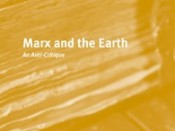
Marx and the Earth: An Anti-Critique
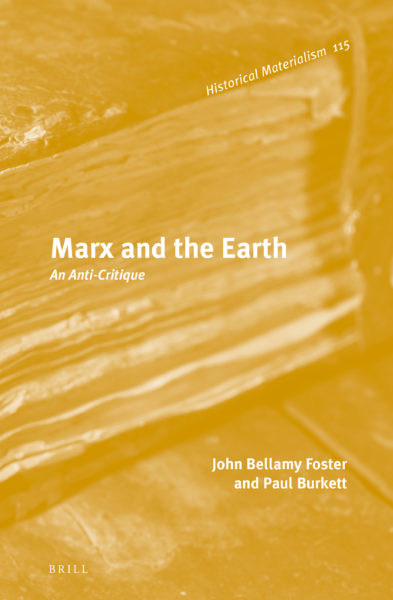
Marx and the Earth: An Anti-Critique [co-authored with Paul Burkett] (Boston: Brill, 2016, hardcover; Chicago: Haymarket Press, March 2017, paperback), 308 pp.
A decade and a half ago John Bellamy Foster and Paul Burkett introduced a new, revolutionary understanding of the ecological foundations of Marx’s thought, demonstrating that Marx’s concepts of the universal metabolism of nature, social metabolism, and metabolic rift prefigured much of modern systems ecology. Ecological relations were shown to be central to Marx’s critique of capitalism, including his value analysis. Now in Marx and the Earth Foster and Burkett expand on this analysis in the process of responding to recent ecosocialist criticisms of Marx. The result is a full-fledged anti-critique—pointing to the crucial roles that dialectics, open-system thermodynamics, intrinsic value, and aesthetic understandings played in the original Marxian critique, holding out the possibility of a new red-green synthesis.
-

The Theory of Monopoly Capitalism: An Elaboration of Marxian Political Economy (New Edition)
 “The Theory of Monopoly Capitalism: An Elaboration of Marxian Political Economy,” (New York: Monthly Review Press, 2014), 320 pp.
“The Theory of Monopoly Capitalism: An Elaboration of Marxian Political Economy,” (New York: Monthly Review Press, 2014), 320 pp.In 1966, Paul Baran and Paul Sweezy published Monopoly Capital, a monumental work of economic theory and social criticism that sought to reveal the basic nature of the capitalism of their time. Their theory, and its continuing elaboration by Sweezy, Harry Magdoff, and others in Monthly Review magazine, influenced generations of radical and heterodox economists. They recognized that Marx’s work was unfinished and itself historically conditioned, and that any attempt to understand capitalism as an evolving phenomenon needed to take changing conditions into account. Having observed the rise of giant monopolistic (or oligopolistic) firms in the twentieth century, they put monopoly capital at the center of their analysis, arguing that the rising surplus such firms accumulated—as a result of their pricing power, massive sales efforts, and other factors—could not be profitably invested back into the economy. Absent any “epoch making innovations” like the automobile or vast new increases in military spending, the result was a general trend toward economic stagnation—a condition that persists, and is increasingly apparent, to this day. Their analysis was also extended to issues of imperialism, or “accumulation on a world scale,” overlapping with the path-breaking work of Samir Amin in particular.
John Bellamy Foster is a leading exponent of this theoretical perspective today, continuing in the tradition of Baran and Sweezy’s Monopoly Capital. This new edition of his essential work, The Theory of Monopoly Capitalism, is a clear and accessible explication of this outlook, brought up to the present, and incorporating an analysis of recently discovered “lost” chapters from Monopoly Capital and correspondence between Baran and Sweezy. It also discusses Magdoff and Sweezy’s analysis of the financialization of the economy in the 1970s, ‘80s, and ‘90s, leading up to the Great Financial Crisis of the opening decade of this century. Foster presents and develops the main arguments of monopoly capital theory, examining its key exponents, and addressing its critics in a way that is thoughtful but rigorous, suspicious of dogma but adamant that the deep-seated problems of today’s monopoly-finance capitalism can only truly be solved in the process of overcoming the system itself.
Foster’s book is brilliantly successful elaborating Marxian political economy and the tendency of monopoly-finance-imperialist capitalism toward stagnation. The book deserves a wide (re-)readership and a new generation of theorists to appreciate the explanatory power of Marxian political economy.
—Hans G. Despain, Marx & Philosophy Review of Books
A clear and powerful explanation of the Marxian political economy, this book is a welcome addition for those who are interested in, or have serious concerns about, monopoly capital as well as economic stagnation, financial instability, and the futures of both capitalism and socialism.
—CHOICE
Essential reading for those attracted by the monopoly capital school.
—The Economic Journal
A clear and forceful elaboration of basic Marxist concepts such as economic surplus, capital accumulation, imperialism, and value.
—Labour/Le Travail
A literate defense of the … Marxian analytical framework of Baran, Sweezy, Kalecki, and Steindl …. Foster develops an improved version of Baran and Sweezy’s … model of of accumulation by adding theoretical refinements.
—Cooperative Economic News Service
Editions:
- Second edition (2013), includes new introduction to second edition by author, pp. 22
- “Introduction to Second Edition” published in Monthly Review 65, no. 3 (July-August 2013), pp. 107-34.
- Japanese language edition, (Tokyo: Uni Agency, 1988).
Translations:
- Chinese Translation of “Introduction to Second Edition” forthcoming in Foreign Theoretical Trends.
-

The Endless Crisis
 “The Endless Crisis: How Monopoly-Finance Capital Produces Stagnation and Upheaval from the USA to China,” (coauthored with Robert W. McChesney, Foster listed first, New York: Monthly Review Press, 2012), 227 pp.
“The Endless Crisis: How Monopoly-Finance Capital Produces Stagnation and Upheaval from the USA to China,” (coauthored with Robert W. McChesney, Foster listed first, New York: Monthly Review Press, 2012), 227 pp.Introduction to book excerpted as “How Monopoly-Finance Capital Leads to Economic Stagnation,” Utne Reader, October 2012.
Translations:
- Polish translation, Book and Press/Le Monde Diplomatique Polish Book Series, 2013;
- German translation (Hamburg: Laika Verlag)
- Arabic translation by Fuad Nassar Center, Ramallah, Palestine.
The days of boom and bubble are over, and the time has come to understand the long-term economic reality. Although the Great Recession officially ended in June 2009, hopes for a new phase of rapid economic expansion were quickly dashed. Instead, growth has been slow, unemployment has remained high, wages and benefits have seen little improvement, poverty has increased, and the trend toward more inequality of incomes and wealth has continued. It appears that the Great Recession has given way to a period of long-term anemic growth, which Foster and McChesney aptly term the Great Stagnation.
This incisive and timely book traces the origins of economic stagnation and explains what it means for a clear understanding of our current situation. The authors point out that increasing monopolization of the economy—when a handful of large firms dominate one or several industries—leads to an over-abundance of capital and too few profitable investment opportunities, with economic stagnation as the result. Absent powerful stimuli to investment, such as historic innovations like the automobile or major government spending, modern capitalist economies have become increasingly dependent on the financial sector to realize profits. And while financialization may have provided a temporary respite from stagnation, it is a solution that cannot last indefinitely, as instability in financial markets over the last half-decade has made clear.
Reviews:
The authors carefully develop a powerful case that the normal state of ‘really existing capitalist economies,’ increasingly dominated by multinational megacorporations along with associated financialization, is not growth with occasional recession, but rather stagnation with occasional escapes that have diminishing prospects. Hence an ‘endless crisis,’ endless in both time and space, including China. And a crisis that is heading towards disaster unless there is a radical change of course. This valuable inquiry should be carefully studied and pondered, and should be taken as an incentive to action.
—Noam Chomsky
In the distinguished tradition of Paul Baran and Paul Sweezy, Foster and McChesney here combine grim analysis with bleak prognosis, reminding us that monopoly power disappeared from the textbooks but not from real life. This is a useful book for anyone raised on the reflexive American optimism of the post-war years.
—James K. Galbraith, author, Inequality and Instability: A Study of the World Economy Just Before the Great Crisis
The Endless Crisis provides a compelling discussion of the central economic reality of our time: that the Wall Street collapse and Great Recession of 2007-09 was a human calamity whose effects are ongoing. Foster and McChesney explore the underlying causes of the crisis as a result of the normal operations of capitalism in its contemporary neoliberal variant. Their discussions on financialization, monopoly power, imperialism, and other topics all provide opportunities for us to think more clearly about what is wrong with the societies we live in and how to advance a transformative political project in behalf of equality and social justice.
—Robert Pollin, Professor of Economics and Co-Director, Political Economy Research Institute, University of Massachusetts-Amherst
The Endless Crisis goes beyond being thought-provoking, well-written, and interesting. In many respects it is chilling in its analysis of the evolution of global capitalism and the contours of the global class struggle. This book constitutes a polemic not only with neo-liberal theory but with those who believe that tinkering with the worst aspects of capitalism will resolve the crisis. Foster and McChesney take the reader into the world of the global monopolies and the plutocracies that they have spawned. When you finish this book you cannot but ask the question: ‘When do we get serious about a strategy for the Left to respond to the system of modern day robber-barons that Foster and McChesney so well analyze?’
—Bill Fletcher, Jr., BlackCommentator.com; author of Solidarity Divided and ‘They’re Bankrupting us’ And Twenty Other Myths about Unions
The most important book yet to appear on stagnation, the central problem of modern economic reality. Essential reading for serious liberal, heterodox, radical, and all open-minded economic thinkers.
—Gar Alperovitz, author, America Beyond Capitalism; Lionel R. Bauman Professor of Political Economy, University of Maryland
John Bellamy Foster and Robert McChesney’s The Endless Crisis very effectively integrates analysis of the development, character, and impact of monopoly-finance capital, which includes the now global and immense reserve army of labor, and with stagnation tendencies harder and harder to overcome. They also demonstrate well the urgency of working class organization on a global basis.
—Edward S. Herman, professor emeritus of finance, the Wharton School, University of Pennsylvania
This is a most remarkable and important book. It is political economy at its best. It offers a sophisticated explanation of the socio-economic crisis facing the global and domestic economies. The authors further argue that the socio-economic crisis cannot be resolved without a total transformation away from the oligopolistic capitalistic system. The work of Foster and McChesney can be embraced by all heterodox political economy traditions.
—Hans G. Despain, Marx & Philosophy Review of Books
A focused and muscular work that ranks alongside the works of John Kenneth Galbraith, Paul Sweezy, Paul Baran and other great political economists who were unafraid to deliver sobering criticisms of modern capitalism. It is a robustly researched testament to the enduring relevance of Marxist theory in the 21st century.
—Philip Louro, New Politics
The Marxist perspective, exemplified in a new book by John Bellamy Foster and Robert McChesney, is also useful. This argues that the strong western growth rates in the middle of the 20th century were something of a mirage . . . The result has been a declining trend rate of growth, and the increased financialisation of western economies as the surpluses have been re-cycled through the banks in a search for yield. Hence the Latin American debt crisis. Hence the sub-prime mortgage crisis. Hence the inability of the global economy to emerge from its torpor.
—Larry Elliott, the Guardian
Read a review by Bernard D’Mello of The Endless Crisis in Economic & Political Weekly on MRzine.org
-

What Every Environmentalist Needs to Know About Capitalism
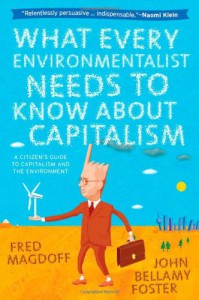 “What Every Environmentalist Needs to Know About Capitalism: A Citizen’s Guide to Capitalism and the Environment,” (co-authored with Fred Magdoff, Magdoff listed first, New York: Monthly Review Press, 2011), 187 pp.
“What Every Environmentalist Needs to Know About Capitalism: A Citizen’s Guide to Capitalism and the Environment,” (co-authored with Fred Magdoff, Magdoff listed first, New York: Monthly Review Press, 2011), 187 pp.There is a growing consensus that the planet is heading toward environmental catastrophe: climate change, ocean acidification, ozone depletion, global freshwater use, loss of biodiversity, and chemical pollution all threaten our future unless we act. What is less clear is how humanity should respond. The contemporary environmental movement is the site of many competing plans and prescriptions, and composed of a diverse set of actors, from militant activists to corporate chief executives.
This short, readable book is a sharply argued manifesto for those environmentalists who reject schemes of “green capitalism” or piecemeal reform. Environmental and economic scholars Magdoff and Foster contend that the struggle to reverse ecological degradation requires a firm grasp of economic reality. Going further, they argue that efforts to reform capitalism along environmental lines or rely solely on new technology to avert catastrophe misses the point. The main cause of the looming environmental disaster is the driving logic of the system itself, and those in power—no matter how “green”—are incapable of making the changes that are necessary.
What Every Environmentalist Needs To Know about Capitalism tackles the two largest issues of our time, the ecological crisis and the faltering capitalist economy, in a way that is thorough, accessible, and sure to provoke debate in the environmental movement.
Reviews:
I’m not sure who needs to read this relentlessly persuasive book more: environmentalists who imagine we can solve the ecological crisis without confronting capitalism, or leftists who have yet to recognize the ecological crisis as the highest expression of the capitalist threat. How about both, and then some. Indispensable.
—Naomi Klein, author, The Shock Doctrine
As we journey through the early stages of the end of the industrial mind an ecological world view awaits us on the horizon. We have no map, but rather a wildly oscillating compass needle. These two bold grown-ups, old hands at hard thinking, are steadying the needle. This book properly pondered will reveal that capitalism is the product of abstract thought whose particularity is to propel us to the edge of humanity’s version of a Petri dish.
—Wes Jackson, President, The Land Institute
With the debate about environmental collapse so dominated by technological, population, and market-based solutions, this book is a powerful antidote. Only by addressing global capitalism can we hope to avert catastrophe. Magdoff and Foster have written an up-to-date, accessible, and comprehensive account of a grim situation, yet manage to inspire the reader with their call for an ‘ecological revolution,’ already in process in parts of the world. An essential book for classroom use, to give to friends who need to learn more about what’s happening to the planet, or for the nightstand as a continual reminder of what’s really important.
—Juliet Schor, author, True Wealth: How and Why Millions of Americans are Creating a Time-Rich, Ecologically-Light, Small-Scale, High-Satisfaction Economy
A superb introduction to an essential conversation about capitalism’s ability to coexist with environmental progress. Magdoff and Foster do an excellent job of addressing the important issues at stake in this debate.
—Michael T. Klare, author, Rising Powers, Shrinking Planet: The New Geopolitics of Energy
Environmental destruction isn’t caused by ignorance or mistaken policies: it is the inevitable result of a social and economic system that puts profit before people and must constantly expand to survive. In this short and clearly written book, Magdoff and Foster explain why that is, why there can be no permanent solution to the environmental crisis so long as capitalism continues, and why greens and socialists must join forces to make an ecological revolution. Every socialist should buy two copies: one to read and learn from, and another to give to a friend who wants to go beyond environmental concern to effective action.
—Ian Angus, editor, Climate and Capitalism
Translations:
- Turkish translation by Original Aksakal, Trails Publishing (2014).
- German translation, Hamburg: Laika-Verlag, 2012.
